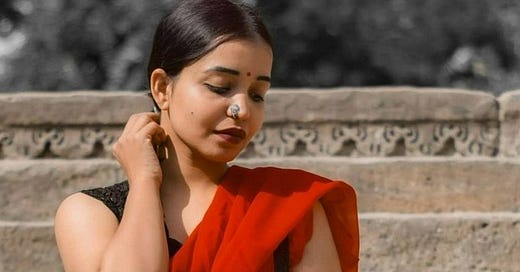An Indian Woman Sets Out to Marry Herself
And kicks off a national furor as other women nod ‘yes’
By: Neeta Lal
On June 11, a 24-year-old Gujarat woman named Kshama Bindu (above), decked out in her red bridal outfit, with henna on her hands and vermilion powder in her hair parting, intends to do the customary seven rounds around the sacred fire and marry herself in what is India’s first sologamy – if she is allowed to pull it off.
The nuptials have triggered a national debate in a country known for its 10 million weddings per year – many of them big fat ones with an ostentatious show of wealth. According to the international accounting firm KPMG, India's current wedding market is estimated at US$50 billion and growing annually at 10 percent. A typical wedding spans four days, with multiple events, hundreds of guests in attendance, and elaborate arrangements costing US$10-15,000.
However, Bindu’s solo event will be markedly different. “I want to be a bride but not a wife,” she told local media. “Self-marriage is a commitment to be there for yourself and unconditional love for oneself," she added.
That is a sentiment that could resonate sharply in a country in which arranged marriages still hold sway, forcing millions of women into relationships they neither want nor in many cases enjoy. According to the Indian Ministry of Home Affairs, 33,796 women and 16,695 girls were forced into marriage in 2016 in India alone—some of them kidnapped in order to do so. The idea of living alone, married to oneself, has considerable appeal.
Accordingly, Bindu’s quest for a radical nuptial has set off fireworks across the country. The priest reportedly has backed out; the wedding venue, a temple, is no longer available while her neighbors have demanded she vacate her flat right away.
Her views have riled politicians. BJP leader Sunita Shukla told The Print that the to-be bride’s decision goes against Hinduism and that such acts would reduce the Hindu population. “Neither the constitution nor society can recognize such a wedding. Children will start following this trend set by her. Even if 100 men and women follow the example set by her, the number of Hindus will reduce by 400, that is if we take an average of two children per family,” said Shukla.
The news has also triggered a debate on Twitter with public opinion splintered on whether sologamy is a good idea or not. While some have applauded the to-be bride by saying she would be an “inspiration” to many, others have slammed the concept as “bizarre” and “crazy.” Some are also wondering what was the need for marriage if there was going to be no partner involved. Some say that by marrying herself, Bindu appears “delusional.”
However, even though sologamy is a revolutionary idea in India, it is a well-known phenomenon in the West where many are choosing to say “I do” to themselves in symbolic ceremonies. While the concept isn’t legal anywhere in the world, reports of people holding mock ceremonies can be found everywhere from Japan to Europe and the UK. The trend has also been the theme of episodes of popular US TV shows such as “Glee” and “Sex and the City.”
Be that as it may, sologamy is still considered a very odd concept for a conservative country like India bedrocked on the institution of marriage and raising a family. Interestingly though, urban Indian women are increasingly marrying late or preferring to remain single, as per recent surveys.
A number of Indian single women this correspondent spoke to said they would love to try out sologamy. “I’d say sologamy is about self-love, acceptance and claiming the social affirmation normally reserved for couples who wed. But if you love yourself, then why not?” asked Ritika Beniwal, 30, a Delhi-based engineer.
However, psychologists say that while marrying yourself is okay, it's important to make sure your other relationships are vibrant and healthy. “If you rely too much on yourself and constantly put your own needs ahead of everyone else, it can be unhealthy and narcissistic. So marrying oneself is a fine balancing act," said Rupali Verma, 56, mother to a 22-year-old.
Single women reportedly constitute 21 percent of India’s female population, or 73 million including unmarried, divorced, separated, and widowed women. Between 2001 and 2011, their numbers increased by almost 40 percent.
“It’s not because the women don’t have partners or lack choices when it comes to their grooms, but they often don’t meet “Mr. Right” and are happier living their life as a strong, independent woman,” said sociologist Shashi Pandey.
Pandey added that changing social dynamics have bestowed upon single women many choices unavailable to previous generations. Economic empowerment and better education have further fueled the trend of staying single. “Women also do not want to remain in abusive marriages which has become a growing menace in India society,” he said. “Times have changed and women no longer require the financial support of a husband which was very common during earlier times. They were forced to remain married due to lack of options.”
Contemporary times also allow women to adopt kids should they so desire without having to marry. “Single women are doing everything that they wish to and which makes them fulfilled and happy without relying on any male counterpart. This is the main reason for the burgeoning population of single Indian women. And given today’s far progressive and liberal social milieu, I see sologamy becoming more and more popular in India,” Pandey said.




For Rupali Verma can you address her as a psychologist first and say which field she studied. Because her being a mom to an adult is not relevant.